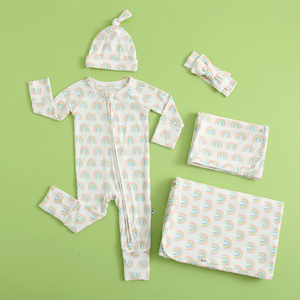
Planning for Discharge: What Life After the NICU Really Looks Like
Share
As your baby leaves the NICU, you're entering a new chapter, one filled with fresh excitement, new routines, and a lot of love. As for when your baby will be discharged, that varies widely. Most NICU discharges happen once a baby has met key milestones, such as breathing on their own, maintaining body temperature, feeding well, and gaining weight steadily. For some families, this may be just a few days after birth; for others, it may be several weeks or even months, depending on the baby’s needs and progress. Knowing that discharge depends on readiness rather than a set number of days can help you focus on your baby’s growth and celebrate each step toward going home.
Understanding the First Days at Home
The first few days at home can feel strange and full of questions. You’ll likely have a follow-up appointment for your baby soon (maybe within a week or two) to check feeding, weight gain, and general progress. You’ll also need to juggle feeding schedules, pumping (if applicable), diaper changes, and tracking growth. It’s normal to feel overwhelmed. Take things one step at a time, focus on bonding, and know that you’re doing great.
Setting Up Your Home with a Simple Checklist
Making your home ready before discharge can ease the transition. Put together a small checklist of must-haves, like bottles or feeding supplies, diapers, clean swaddles, and a cozy place for your baby to sleep safely. Also think about easy meals for yourself, nap routines, and an organized diapering station. Having these small preparations helps your days feel calmer and more in control, one peaceful moment at a time.
Building Your Post-NICU Support Team
You are not alone. It takes a village, especially in these early days. Let someone close to you check in by phone, drop off a small meal, or run errands for you. Ask a friend or family member to help with sibling care, grocery runs, or laundry when you need a break. Even short messages or encouragement can make a big difference when you're caring for your baby at home. Small acts of service are often the most comforting.
Keeping Track of Appointments & Baby’s Needs
It’s easy to mix up dates or times when you’re exhausted and busy. A simple calendar, either on your fridge or your phone, can list doctor's visits, an appointment for vaccines, or a lactation counselor check-in. Include your baby’s feeding and diaper log, too, as this can help doctors or nurses see any trends. Tracking helps you feel grounded and prevents last-minute scrambling.
Managing Your Own Recovery and Self-Care
You’re important too, even when all eyes are on your baby. Make sure you rest when you can – even fifteen minutes of quiet helps you regain energy. Eat small, nourishing snacks or meals and keep water nearby to stay hydrated. Don't hesitate to ask your pediatrician, nurse, or case manager what signs to watch for in yourself. You can also ask your partner, a family member, or a close friend to check in on your recovery too. Small nurtures for you help you care for your baby better.
Getting the Medical Supplies and Help You Need
Leaving the NICU might feel medical, so it is okay to ask for help. Make sure you have clear instructions on feeding, medications, oxygen (if needed), and special care routines. Hospitals often connect you with a discharge planner who explains these steps, and they can let you know what items can be delivered or where to get replacements. Keeping all this straight (even though it is a lot) will become part of your normal, and you’ll grow more confident each day.
When Things Don’t Go as Planned
Sometimes your baby might need a follow-up or extra care, such as therapy, home nursing, or a readmission. It can feel discouraging, but remember that each adjustment is part of caring well. If you feel overwhelmed, reach out to your NICU team, pediatrician, or home health provider to talk through options. Your baby is still growing, and every step is part of their journey forward.
Helpful Websites for New NICU Graduates
Here are some trusted websites you can visit for guidance and support:
- March of Dimes – NICU and Discharge Support: practical tips on transitioning home and caring for premature babies. (marchofdimes.org)
- Johns Hopkins Medicine – Hospital Discharge Planning: clear explanation of what discharge planning involves and what to expect. (hopkinsmedicine.org)
- Boston Medical Center – When You Leave: helpful steps on timing of discharge and what to check before going home. (bmchealthsystem.org)
Welcome to Your New and Exciting Life
Leaving the NICU is a big moment. It marks the start of a whole new life filled with both joy and learning curves. Take each day as it comes, lean into your support group, and remember that this is your family growing stronger together. You're not just returning home—you’re bringing your baby into a world filled with love, care, and hope.





































